What Kind of Website Do I Need?
- December 13th, 2021
-
Branding
Marketing
Web
- Swarm Digital
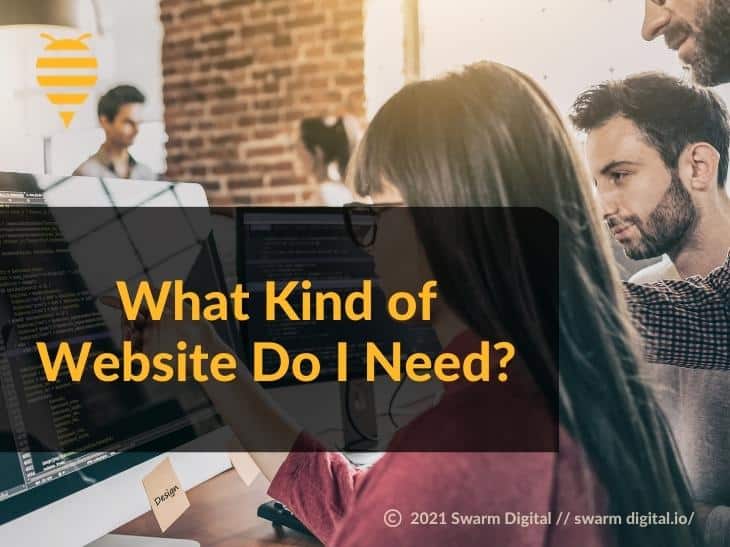
Do you want a website, and are not sure where to start? Do you want to have a general understanding of the options, concepts, and terminology? This guide provides tips for identifying what kind of website you might need and how we might be able to help you achieve your goals.
3 Questions for Deciding What Type of Website You Need
- What are the different types of websites?
- How do I know which website is best for me?
- What is the next step to creating my website?
Understanding your target audience and the purpose behind your website will help identify what kind of site you need. By the time you’re finished reading this article, you will have a better understanding of what you need and what your next steps are.
What are the different types of websites?
At Swarm, we describe websites in three general categories:
- Marketing / Brochure Website
- Ecommerce Website
- Web Application
Marketing / Brochure Website
These are the most common websites on the Internet. They display information to their online visitors, and that is their sole purpose. These sites do not process financial transactions (that would be e-commerce). The functionality of these websites does not require software engineers to design and code complex solutions to novel problems (that would be a Web Application). These websites typically take advantage of industry-standard platforms such as WordPress.
These websites display enough information to persuade visitors to take desired actions. Owners of marketing websites often encourage their visitors to fill out a contact form, make an appointment on a calendar, start an online chat, or call a phone number.
Just because you hope to sell something with your website, doesn’t mean you need an ecommerce website. Many professional services and organizations use brochure websites to sell their offerings, but the actual financial transaction takes place off the website (such as over the phone or in-person).
Many professional services and organizations benefit from a certain level of credibility. A marketing and brochure website, designed and developed by Swarm Digital, will raise your profile and provide the online credibility you need.
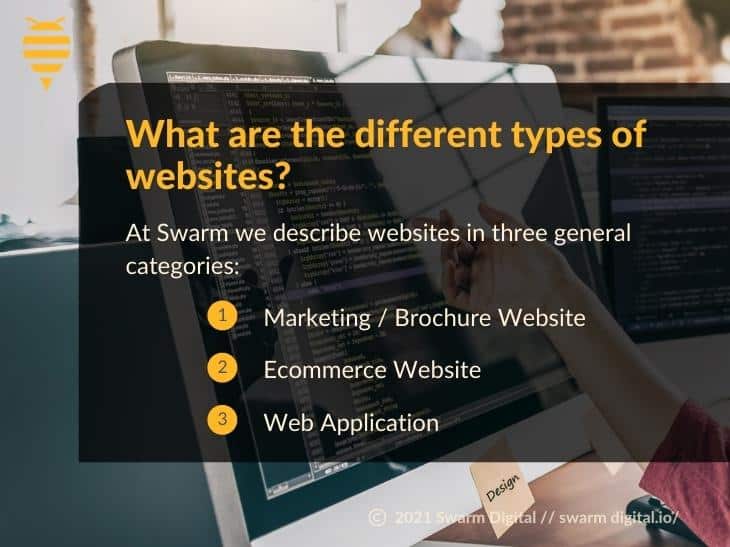
Ecommerce Website
Ecommerce websites allow visitors to complete purchases of goods and services (or make donations) directly on the website and often accept multiple forms of payment, such as a credit card, debit card, PayPal, Google Pay, Apple Pay, or any of the other forms of payment.
In addition to online payment processing, ecommerce websites often contain all of the features of a marketing and brochure website.
If you need to process payments on your website, then you need an ecommerce website.
Web Application
Web applications are by far the most complex types of websites. The vast majority of the time, your idea will fit into either the marketing/brochure category or the e-commerce category. But sometimes the idea is so unique (or complex) that it requires a team of software engineers, user experience (UX) / user interface (UI) designers, and managers to custom design the code, functionality, and presentation of your website.
Web applications typically also include all of the features of the brochure website and the ecommerce website.
If you think your website idea might fall into this category, contact us right now, and let’s schedule a free consultation.
What are some of the other descriptions for common website types?
The above categories are how we here at Swarm differentiate the different types of websites. We understand that there are many different ways to describe them. Below is a list of common features and descriptions that may help you to understand your website needs.
Some of the most common types of websites within these categories are:
- Blogs
- Corporate
- Personal
- Informational
- Membership/Social Media
- Photo Sharing
There are many other types, but we will explain the purposes of these. If you are considering a different kind of website not listed here, please contact us and share your vision.
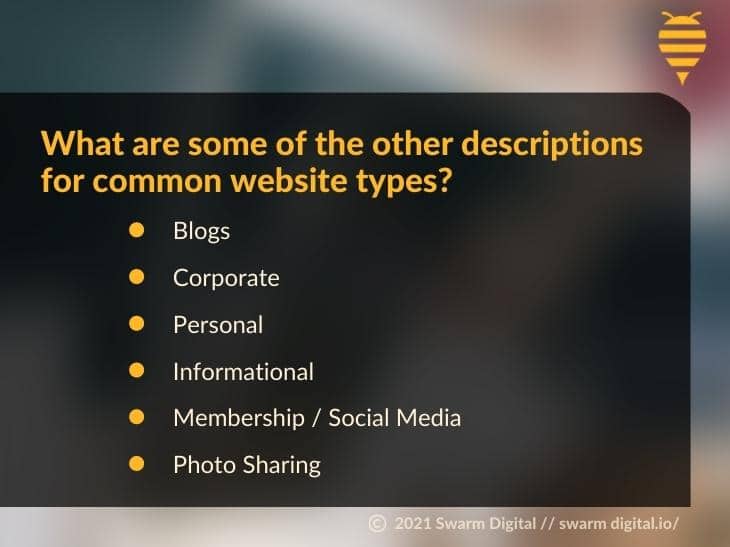
Blogs
While many websites contain blog features, some websites are dedicated to just blogging. A blog generally features a journaling style with links to articles. It is updated frequently and sorted by date for easy reference. Many blogs serve to enhance a personal brand, but businesses also often use blogs to present information or educate their customers about products and the industry. In this case, the published pieces are often referred to as “articles of content” to differentiate from the connotations associated with “blogging”.
Corporate Sites
Because over 81% of shoppers do research online before making a purchase, businesses should have a presence online. Whether a site is purely for information or includes the ability to purchase products or services, corporate sites offer Internet users the ability to understand the company before choosing to do business with them.
Personal
Artists, celebrities, authors, and more have personal websites. These may serve as a portfolio of the individual’s work, and accomplishments, or tell a person’s story. Personal sites tend to be smaller and more static. They may also include e-commerce or blogging features.
Informational
Finding information online may be as easy as a simple Google search. However, some info is more difficult to find and may take additional research. Informational websites provide data to users on one or many topics. News sites, wikis, and online libraries would fall under this category.
Membership / Social Media
Connecting family, friends, niche markets, and users worldwide, social media sites like Facebook and Instagram are popular for sharing photos, personal information, and even selling things. The broad reach of social media and forums allows people to connect in ways that overcome physical-distance boundaries.
Photo Sharing
Sites dedicated to photo sharing, like Unsplash or Flickr, allow users to upload photos and share them with anyone. Some photo-sharing websites may also be e-commerce, like Shutterstock, allowing users to sell professional photography to others.
As you may have realized while reading through this list, many websites have more than one of these features, and some have several. When building a website, it helps to understand the available functionality and how it can best serve your needs.
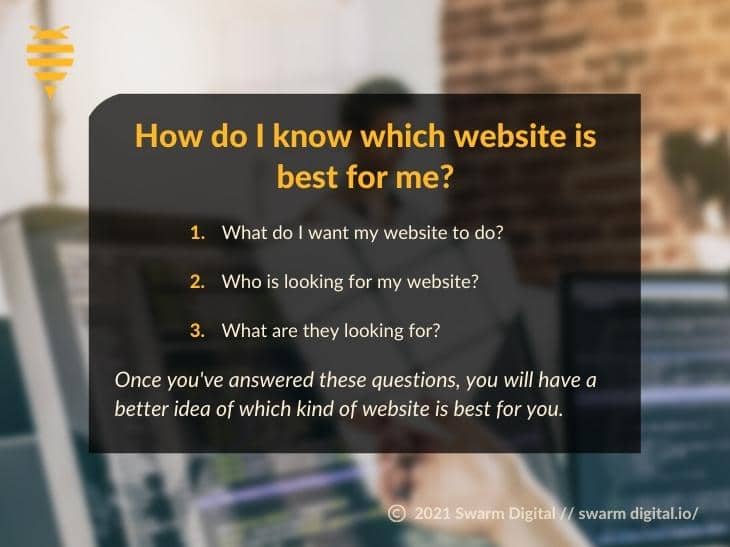
How do I know which website is best for me?
Let’s narrow things down a bit more.
- What do I want my website to do?
- Who is looking for my website?
- What are they looking for?
Once you’ve answered these questions, you will have a better idea of which kind of website is best for you.
What do I want my website to do?
Or, put another way, why do I feel that I need a website? Do you have a business seeking to get online? If so, a corporate website could be the right way to go. Do you need a website that offers goods or services to clients and customers? E-commerce websites are an excellent choice for selling online. Perhaps you find yourself in a niche market and need to connect with people. If so, a social media/membership site could be the right one for you.
Beyond establishing the type of website, it is also wise to consider how your website will help you achieve your goals. Is this site going to improve your bottom line by saving money? Perhaps you have traditionally mailed information to people and could save money on postage with a brochure or personal site detailing your story and resume or portfolio.
Websites can improve communication with business customers, or, for non-profit entities, a website can detail the mission about which you feel strongly. Understanding your goals in creating a website will help narrow down the site that best meets those needs.
Who is looking for my site?
Do I have customers seeking information about my products or attempting to purchase them online? Or are there potential clients seeking my services in a specific industry? By targeting particular markets with your website, you can understand how best to answer their questions. It may be helpful to create personas or examples of the “typical” person you expect your website to reach. Will they be using a cell phone or a desktop computer? Are you targeting an older demographic who may struggle to use technology or a younger generation who finds it simple?
Another question to consider is: how will they find my website online? Is there email or in-person marketing that will point them directly to my site, or will they be searching for it online? In very niche markets, word-of-mouth may be a vital source of new contacts for a website. A well-thought-out brochure site could be critical for gaining the trust of new connections.
What are they looking for?
Once you have identified the particular persona you are hoping to reach with your website, you can answer this question. Are your users looking for information or experience? Are they seeking out your story and background or looking for your products and services to purchase? Is their goal to connect with others and share media or learn more about a hot topic or trend?
The wide variety between internet users demands a closer look at the questions they are answering. If this seems a daunting task for you, we would be happy to help you narrow down your options to find the best website to reach your goals.
As experts in web design, SEO, and digital marketing, we take your needs seriously. Assisting people in understanding websites and internet marketing can help them get online faster, save money, and increase their potential for new connections.
Once you have established the type of website for your needs, it is time to take the next step – actually creating the site.
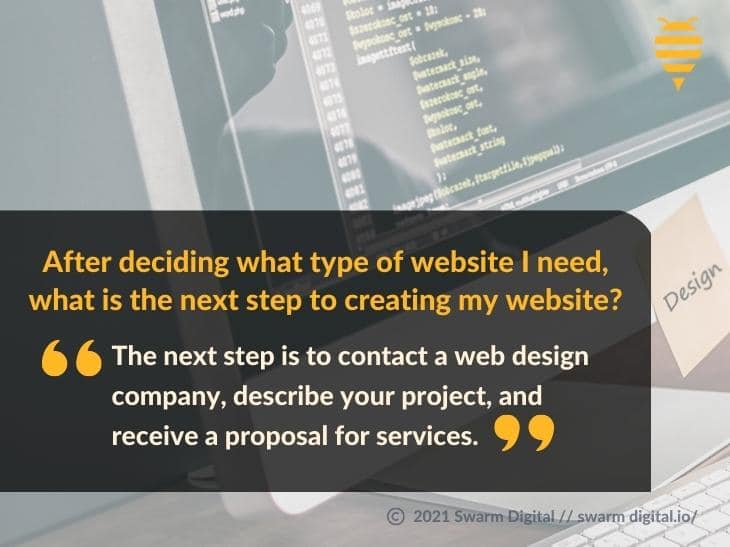
After deciding what type of website I need, what is the next step to creating my website?
The next step is to contact a web design company, describe your project, and receive a proposal for services. It’s our goal in producing this guide that you will contact us and give us the chance to present you with a proposal.
If this guide helped you, contact us right now, and let’s schedule a free consultation. We’re eager to learn more about your website project, and we’re eager to show you that we’re willing to earn your business.
